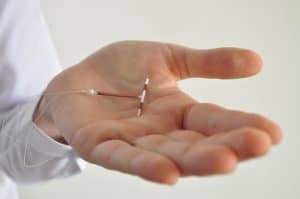Bayer Has Withdrawn Its Essure Implants from the European Market
 Health issues with the permanent birth control product Essure have been reported both in the US and abroad. The risks associated with the device, used for female sterilization, have led the Food and Drug Administration to issue the most serious warning available, a black box warning, with each prescription. Are these steps too little too late for women who have been harmed by a defective product?
Health issues with the permanent birth control product Essure have been reported both in the US and abroad. The risks associated with the device, used for female sterilization, have led the Food and Drug Administration to issue the most serious warning available, a black box warning, with each prescription. Are these steps too little too late for women who have been harmed by a defective product?
How Essure works
For women who have made the decision not to have any future children, the medical follow-up can be onerous. Essure is designed to be a nonsurgical, permanent birth control method that does not lead to early menopause or other hormonal side effects, by situating two nickel-titanium coils in the fallopian tubes. This leads to the production of scar tissue, which blocks semen from reaching any eggs, preventing fertilization and pregnancy. Because the rate at which scar tissue forms varies from person to person, women must use backup protection until their doctors have verified via x-ray or ultrasound that the fallopian tubes are fully blocked. In the best-case scenario, this takes 90 days and involves minimal discomfort.
Risks and side effects of using Essure
While Bayer has not released many specific statistics on the number of women who experienced unwanted side effects from the insertion of Essure, the company is now facing more than 10,000 lawsuits in the U.S. alone. One risk is the breaking of the Essure implant, which can then migrate and cause scar tissue to form in an unwanted area. Another danger is perforation of the uterus, fallopian tube, bowel or bladder during the placement procedure, which occurred in at least 1.8% of women during Essure’s premarket study. Some women experienced persistent pelvic pain or bleeding, sometimes seriously enough to warrant surgical removal of the implant. Essure also has been implicated in exacerbating existing autoimmune disorders.
The FDA’s official response
Essure has been on the market in the US since 2002. In 2016, the FDA added the black box warning to Essure; Bayer made that image the banner on their Essure website. Also in 2016, the FDA undertook a new mandatory clinical study aimed at exploring whether any group of women was more predisposed than another to specific side effects or risks. Bayer also was tasked with mandatory post-market surveillance of patients, comparing the risks of Essure with the leading competition in permanent female sterilization, surgical tubal ligation surgery (often called “tube tying”).
The FDA’s steps are prudent, but they offer little relief to the millions of women who already agreed to Essure placement in good faith and then suffered serious, painful, long-term side effects and health issues. Women had been receiving Essure implants for more than a decade before the FDA took action in the past two years to ask for further study. No patient in the US or abroad should suffer because of a defective product.
If you or a family member has used Essure and suffered from health issues as a result, or been the victim of any bad drug or defective product, it might be hard to know whom to turn to for assistance. The skilled Georgia product liability attorneys at Harris Lowry Manton LLP are here for you. To arrange a no-obligation consultation, give our firm a call at 404-961-7650 at our Atlanta office, or in Savannah at 912-651-9967, or complete our contact form.

Harris Lowry Manton LLP is a dedicated full-service trial law firm. Our Georgia personal injury lawyers fight for the injured throughout every step of the legal process. We explain how litigation works from the moment you come into one of our offices in Atlanta or Savannah until your case is solved. Our legal team has achieved remarkable success because we leave no stone unturned when investigating our client’ claims and what should have been done to prevent their injuries. We file claims against all responsible parties — not just the most obvious one.
Read more about Harris Lowry Manton LLP.